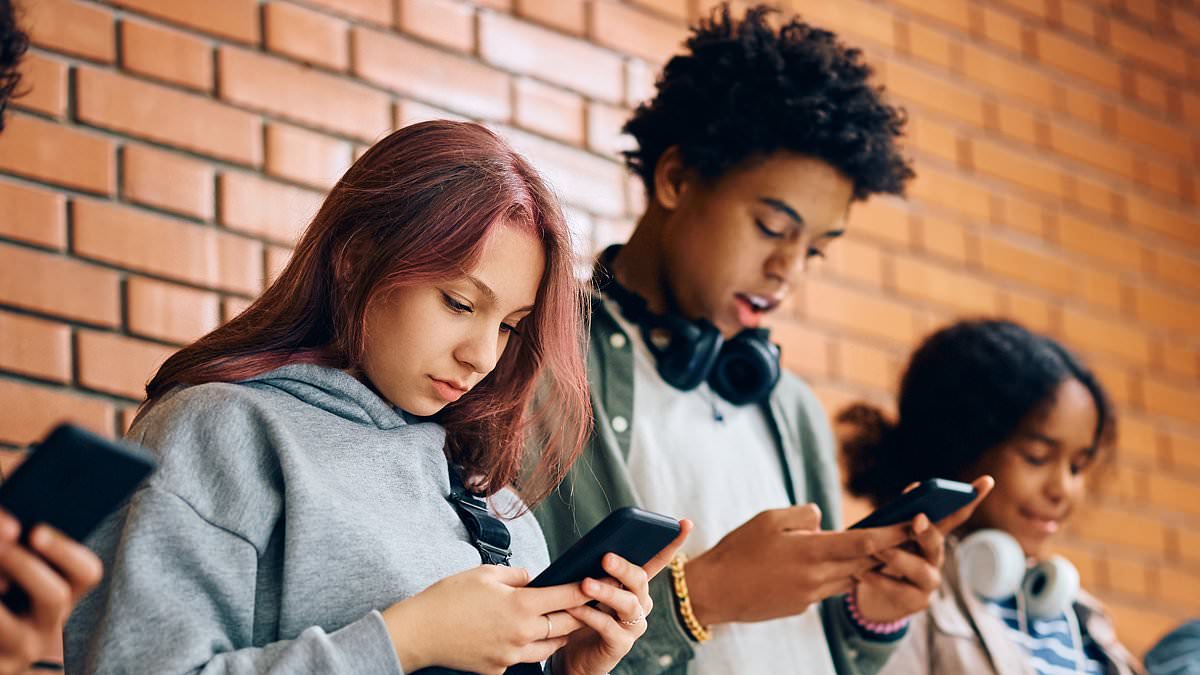A leading n entrepreneur claims the Albanese government’s ‘world-leading’ legislation to ban social media for all children under 16 is going to ‘introduce a national ID card by stealth’.
Matt Barrie, chief executive of outsourcing marketplace Freelancer, said Labor’s ‘completely mental’ plans are ‘literally Orwellian, it’s pretty much the definition of fascism’.
Social media platforms such as Facebook, Instagram, TikTok and X will have only a year from when the law is passed to work out how to enforce the strict age limit.
There will be no exemptions if children already have accounts, nor if their parents or guardians give them permission to use the sites. Children and parents will not be reprimanded for rule breaking, Prime Minister Anthony Albanese said, with social media companies facing penalties instead.
The Government hasn’t yet explained how it expects social media platforms to enforce the age limit.
Meta, which owns Instagram and Facebook among other apps, said it will comply with the age limit, but has expressed concern that current technology is inadequate to effectively enforce it.
‘The idea that somehow you can sort of force the industry to be in a technological place that it isn’t, is probably a bit misunderstood in terms of where the industry is,’ Meta’s global head of safety, Antigone Davis, told The Guardian.
‘The current state of age assurance technology… requires a level of personally identified information to be shared.’
This would likely involve a type of facial recognition software, with a form of ID required to confirm someone’s identity.
In an interview with veteran Liberal MP Russell Broadbent, Mr Barrie pointed out the wide-reaching implications of a ban on under-16s using social media.
‘Nobody wants to be forced to upload their licence to use the internet, which is basically what this is,’ he said.
‘The only way you can stop 16-year-old kids or less (from using) the internet is you’re going to have to upload your ID to every platform on the internet where you’re chatting away or you’re watching videos or whatever it may be.
‘And so really this is by stealth a way of introducing a National ID card.’
Mr Barrie said his message for Mr Albanese is that ‘I don’t know what you’re doing. I literally have absolutely no clue what you’re doing’.
‘It just seems to be the actions of someone who’s just very weak willed, that they want to control the narrative on the internet,’ he said.
The Prime Minister, though, sees things very differently, saying ‘social media is doing harm to our kids and I’m calling time on it’.
He said he had spoken to ‘thousands of parents, grandparents, aunties and uncles’ on the issue.
‘They, like me, are worried sick about the safety of our kids online,’ Mr Albanese said.
‘I want n families to know that the government has your back. I want parents to be able to say, “Sorry, mate, that’s against the law”.’
In August 2023, speaking on the Neil Mitchell Asks Why podcast, Mr Albanese went much further.
When Mitchell asked him what he would be his first act if he was a dictator, he replied that he would ‘ban social media’.
Asked why, Mr Albanese said there were ‘a couple of things’.
‘One is keyboard warriors who can anonymously say anything at all, without any fear,’ he said.
‘The sort of things that they would never say to you face to face, they can just assert as fact.’
The issue is also dividing academics, even between those from the same university.
La Trobe University’s Professor Therese Keane backs the proposed ban on under-16s using social media.
‘Social media is affecting our children in so many ways, from self-esteem issues to an inability to interact in person, through to misinformation, harmful content and dangerous TikTok challenges,’ she said.
‘Social media companies cannot and will not self-regulate their platforms. It is a very encouraging and brave step the government has made to take control.
‘Social media companies have been given ample opportunities to address these issues but it is not in their best interests to do so.
‘These companies need to face the reality that their products have a negative impact on children.’
But Prof Keane’s La Trobe University colleague Dr Alexia Maddox disagreed with a ‘blanket ban’.
‘While protecting young people online is crucial, recent evidence suggests the relationship between social media use and youth mental health is more complex than public discourse suggests,’ Dr Maddox said.
‘The timing of this proposal, ahead of the election, appears to capitalise on parental anxieties rather than engage with the nuanced evidence base.
‘The research community is divided on this issue. Some experts advocate for access restrictions, while others emphasise digital rights and the importance of developing online resilience.’
Dr Maddox called for the government to take a broader look at the situation.
‘What’s clear is that blanket bans may create unintended consequences, potentially driving young people to less regulated spaces or cutting them off from valuable support networks,’ she said.
‘Rather than rushed legislation, we need evidence-based policy that addresses platform design, improves digital literacy and creates safer online environments for all users.’
